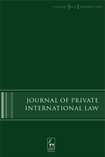In Memoriam: Professor Kurt Lipstein
 Professor Kurt Lipstein, one of the greatest comparative lawyers of the twentieth century, passed away at 11:15pm on Saturday 2nd December 2006. His wife Gwyneth predeceased him in 1998 and he is survived by two daughters, Eve and Diana. Happily he was active to the very end of his life, and attended his last public function in the Law Faculty (20th November) on the occasion of the 70th anniversary of obtaining his PhD. In September 2006, Cambridge University compiled an account of his extraordinary career:
Professor Kurt Lipstein, one of the greatest comparative lawyers of the twentieth century, passed away at 11:15pm on Saturday 2nd December 2006. His wife Gwyneth predeceased him in 1998 and he is survived by two daughters, Eve and Diana. Happily he was active to the very end of his life, and attended his last public function in the Law Faculty (20th November) on the occasion of the 70th anniversary of obtaining his PhD. In September 2006, Cambridge University compiled an account of his extraordinary career:
Kurt Lipstein was born in Frankfurt am Main, Germany on 19th March 1909. His father was from Königsberg in East Prussia (now Russia) and his mother from Frankfurt. He had an English great-grandfather, and his grandmother had grown up in England. This explained the relative ease with which Kurt eventually settled into England. After his schooling at the Goethe Gymnasium in Frankfurt, Kurt studied law at the University of Grenoble (1927) and Friedrich Wilhelm University in Berlin (1927-31). Here, he rubbed shoulders (metaphorically if not actually) with professors such as Wolff and Rabels, and younger colleagues including von Caemmerer, and Mezger. His classical education in Greek and Latin allowed him later to have clear insights into the inner workings of Roman Law – these days something of a lost art.
Once graduated, his practical legal training began in 1931 as Referendar in Königstein and then at the district of Court of Appeal of Frankfurt, but with the election of the National Socialists to power, his career effectively collapsed. In April 1933 employment in the civil service was barred to Jewish professionals, and in 1934 Kurt emigrated to England to escape persecution. He obtained a place at Trinity College to study for his PhD, which was on the subject of suretyship within Roman Law: the beneficium cedendarum actionum. This was successfully defended in 1936 before Martin Wolff’s brother-in-law, H. F. Jolowicz, who was then Professor of Roman Law at the University of London.
At that point, financial matters reared their head. He was unsuccessful in applying for a scholarship at Trinity, was unwilling to become a burden on the English branch of his extended family. His savior, and his mentor was Harold Gutteridge, the Professor of Comparative Law, who, in 1937, began to pay Kurt from his own pocket to give “supervisions” in Roman Law, Public International Law and Constitutional Law.
Soon after the Second World War broke out (1940) Kurt was interned as an enemy alien and sent to camps at Bury St Edmunds and then Liverpool. Here he met an eclectic mix of academics and professionals, many of whom later went on to either high office or academic status (or both). He mentions some of these in the interviews that are archived elsewhere on this site (as a transcript published by the IJLI, and the original audio version). Luckily the university secured his release later in the year, and he returned to Cambridge where he was given membership of Clare College, with which he has been associated ever since. He became a fellow in 1956. In 2002, fellow legal academics at the college (Moore & Turpin, 2002) conducted an interview with Kurt to reminisce on his associations therewith.
The Faculty Board employed Kurt as Faculty Secretary for a small stipend, and in 1944 he married Gwyneth Herford. After the war, in 1946, he was appointed to one of a batch of new lectureships (which included David Daube, Trevor Thomas and R. Y. Jennings), and he remained in this post until 1962, when he was appointed Reader in Conflict of Laws. In 1973 Kurt became Professor of Comparative Law, following in the footsteps of his erstwhile friend and patron Harold Gutteridge, of whom he reminisces affectionately in our interviews. In 1977 the University awarded him his LLD.
Kurt Lipstein formally retired in 1977, but to this day (Michaelmas Term 2006, in his 98th year) he has continued to give supervisions with great enthusiasm and charisma to students at Clare College, and has remained academically active and scholastically productive. He also lectures at the annual Summer School in English Legal Methods offered by the Faculty of Law. His success with the students is grounded in his legal knowledge, but there is no doubt that his charm and sense of humour have much to do with his popularity.
Kurt Lipstein has an unparalleled association with the Squire Law Library, having occupied offices and worked as a scholar in each of its manifestations: Downing Street (1934-37), The Old Schools (1937-1995), and now the glass and concrete titanic West Road site (1995-). This is a unique achievement, and exploring his memories of its personalities and how the library developed over those 72 years, forms the core of the interviews we conducted with Kurt in 2004. Remember, the Squire Law Library is only four years older than Kurt and it is fascinating to hear how relatively small and parochial the collections appear to have been in those early years.
Kurt has a long publications record, but many of his writings are in Festschriften and similar works that are not readily available in our digitised age: 14 from his total of 118 publications, and readers might find some of his publications difficult to lay their hands on. In the bibliography, we have listed all those for which we can account.
Although his earliest works dealt with Roman Law, Kurt’s reputation and later career rest largely on his studies on the conflict of laws within international law (both public and private), and his views (with Gutteridge) have strongly influenced the coverage of the subject in Dicey & Morris’s Conflict of Laws (Forsyth 2004). An important development in broadening his horizons on the reception of western law into jurisdictions with different cultures, was his appointment as Directeur des Recherches of the International Association of Legal Science for the period 1954-59. The results of this are apparent in the five publications Kurt produced on the legal regimes in Turkey and India.
During our interviews, it was clear that Kurt was particularly sensible (the word proud would be an unworthy epithet for such a self-effacing man) of the honour accorded him on his invitation to give The Hague lectures in 1972 (and which he published separately in 1976). When he was asked for the highlights of his career at the end of the interviews, he replied; the achievement of an academic career, the title of Queen’s Counsel, and his membership of the Institute of International Law.
His academic career has been long and fruitful, and its legacy is bound to be felt for the foreseeable future. As for the others, Kurt was called to the Bar (Middle Temple) in 1950, and in 1993 he was elected to the Institut de Droit International. The Institut then gave him the task of preparing a Resolution on a theme of “Taking foreign private international [law] into consideration”. This was a taxing remit: under the heading “Renvoi” it had twice previously come before the Institut for resolution (1896-1900 & 1957-1965), with inconclusive results. Kurt Lipstein tackled it with his usual foresight, and when he reported (in 1998), as he modesty put it, his new “Resolution was accepted with few modifications” (Lipstein 2004 p. 769). The question of his success, where others had failed, was raised during our interviews (question 73), and his reply is a model of understatement.
His final highlight was achieved when he was made an Honorary Queen’s Counsel in 1998. Kurt was an Honorary Fellow of Wolfson College, and still lives in the secluded house in Newnham he built in 1947-8 and shared with Clive Parry, and their respective families.
Finally, it is clear from the last paragraph of his own reminiscences of his time at Cambridge, that Kurt Lipstein feels he owes a debt of gratitude to the institution that gave him the chance to make a new life when the land of his birth was no longer welcoming (Lipstein 2004). This has manifest itself in a lifetime devoted to upholding its values and faithfully following a path of true scholarship.
A bibiography of all of Professor Lipstein's published works can be found here, and you can also look through an archive of photos charting Professor Lipstein's life. A series of interviews with the man himself can be downloaded from here, and you can leave your thoughts and condolences on the comments board on the Cambridge website. Our thoughts are with his family, as I'm sure are all those who have felt the influence of Professor Lipstein's unparalleled scholarship in the field over the last seventy years.




 The Graveson Memorial Lecture 2006 in memory of Professor R H Graveson CBE QC
The Graveson Memorial Lecture 2006 in memory of Professor R H Graveson CBE QC